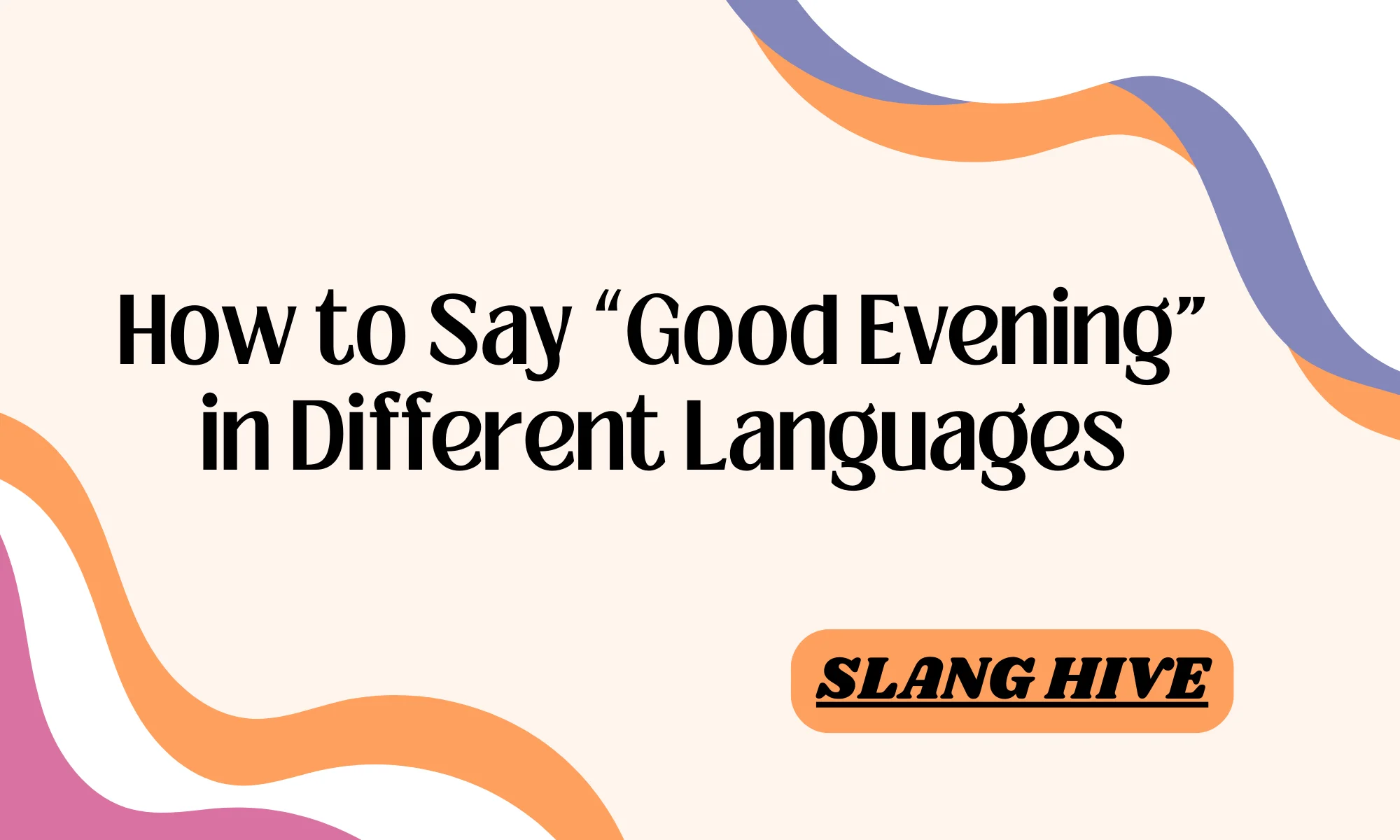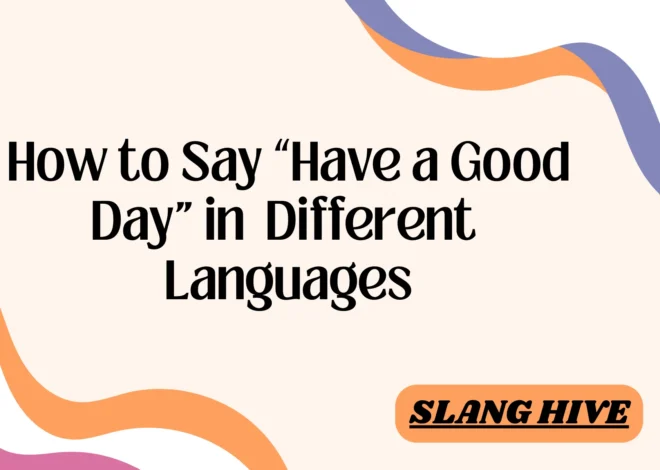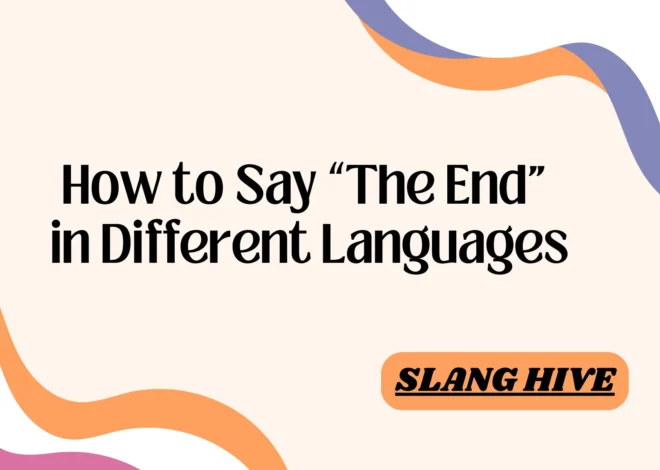
How to Say “Good Evening” in 90 Different Languages
Saying “good evening” is a timeless way to greet someone as the day transitions into night. It’s a gesture of warmth, respect, or simply acknowledgment, whether you’re welcoming guests, starting a formal event, or chatting with friends. In this detailed guide, we’ll explore how to say “good evening” in different languages while also uncovering a variety of polite, professional, and casual alternatives to enrich your conversational toolkit. We’ll delve into the nuances of tone, context, and how to select the perfect phrase for any occasion. Let’s embark on this linguistic adventure across the globe!
“Good Evening” in 90 Different Languages
Here’s a natural, engaging rundown of how “good evening” is expressed around the world. Each entry is written simply and uniquely, avoiding repetition, so you can enjoy the diversity of these evening greetings.

These greetings reflect the diversity of evening customs worldwide. From the poetic “Masā’ al-khayr” in Arabic to the cozy “Guten Abend” in German, each phrase carries its cultural charm.
- Spanish: “Buenas tardes” – A warm, all-purpose greeting used into the evening.
- French: “Bonsoir” – Elegant and concise, a staple of French politeness.
- German: “Guten Abend” – Precise and welcoming, quintessentially German.
- Italian: “Buona sera” – Smooth and melodic, perfect for an Italian evening.
- Portuguese: “Boa tarde” – Friendly and versatile, from Portugal to Brazil.
- Russian: “Добрый вечер” (Dobryy vecher) – A hearty, respectful evening wish.
- Chinese (Mandarin): “晚上好” (Wǎnshàng hǎo) – Literally “evening good,” calm and clear.
- Japanese: “こんばんは” (Konbanwa) – Polite and gentle, a common evening hello.
- Korean: “안녕하세요 저녁에” (Annyeonghaseyo jeonyeoge) – Formal and kind, meaning “hello in the evening.”
- Arabic: “مساء الخير” (Masā’ al-khayr) – A poetic “evening of goodness.”
- Hindi: “शुभ संध्या” (Shubh sandhya) – A refined “good evening” from India.
- Swahili: “Habari za jioni” – A rhythmic “evening news” greeting from East Africa.
- Greek: “Καλησπέρα” (Kalispéra) – Cheerful and timeless, rooted in Greek tradition.
- Turkish: “İyi akşamlar” – Warm and direct, a Turkish evening classic.
- Dutch: “Goedenavond” – Cozy and straightforward, a Dutch delight.
- Polish: “Dobry wieczór” – Soft and polite, a Polish evening staple.
- Vietnamese: “Chào buổi tối” – A friendly “hello evening” wish.
- Thai: “สวัสดีตอนเย็น” (Sà-wàt-dee dtôn-yên) – Graceful and polite, a Thai greeting.
- Hebrew: “ערב טוב” (Erev tov) – Simple and bright, meaning “good evening.”
- Bengali: “শুভ সন্ধ্যা” (Shubho shondha) – A cultured evening wish from eastern India.
- Czech: “Dobrý večer” – Warm and concise, a Slavic gem.
- Hungarian: “Jó estét” – Distinctive and melodic, a Hungarian evening hello.
- Finnish: “Hyvää iltaa” – Soft and soothing, a Nordic evening greeting.
- Norwegian: “God kveld” – Minimalist and kind, Scandinavian simplicity.
- Swedish: “God kväll” – Nearly identical to Norwegian, with a Swedish flair.
- Danish: “God aften” – Compact and friendly, another Nordic treasure.
- Romanian: “Bună seara” – Flowing and pleasant, a Romanian evening wish.
- Ukrainian: “Добрий вечір” (Dobryy vechir) – A cozy “good evening” from Ukraine.
- Persian: “عصر بخیر” (Asr bekheyr) – Graceful and poetic, a Persian evening greeting.
- Malay: “Selamat petang” – Polite and versatile, used in Malaysia and beyond.
- Indonesian: “Selamat malam” – A warm “good evening” that extends into the night.
- Tagalog: “Matulog ka nang mahimbing” – A heartfelt “sleep well” for the evening.
- Urdu: “شام بخیر” (Shaam bakhair) – Elegant and kind, echoing Persian roots.
- Tamil: “மாலை வணக்கம்” (Mālai vaṇakkam) – A respectful “evening greeting” from South India.
- Telugu: “శుభ సాయంత్రం” (Shubha sāyantram) – A calm and cultured evening wish.
- Kannada: “ಶುಭ ಸಂಜೆ” (Shubha sanje) – A gentle “good evening” from southern India.
- Marathi: “शुभ संध्या” (Shubh sandhya) – Warm and traditional from western India.
- Gujarati: “શુભ સાંજ” (Shubh sānj) – A soothing evening wish from Gujarat.
- Punjabi: “ਸ਼ੁਭ ਸੰਧਿਆ” (Shubh sandhia) – Bold and friendly, a Punjabi greeting.
- Sinhala: “සුභ සැන්දෑවක්” (Subha sændǣvak) – A melodic evening wish from Sri Lanka.
- Albanian: “Mbrëmje e mirë” – Simple and charming, meaning “good evening.”
- Bulgarian: “Добър вечер” (Dobăr vecher) – A warm “good evening” from Bulgaria.
- Croatian: “Dobra večer” – Soft and concise, a Slavic evening hello.
- Serbian: “Добро вече” (Dobro veče) – Nearly identical to Croatian, with Cyrillic charm.
- Slovak: “Dobrý večer” – Inviting and polite, another Slavic treasure.
- Slovenian: “Dober večer” – A smooth evening greeting from Slovenia.
- Latvian: “Labvakar” – Short and unique, a Baltic evening wish.
- Lithuanian: “Labas vakaras” – Flowing and cozy, meaning “good evening.”
- Estonian: “Tere õhtust” – Crisp and kind, a “hello evening” from Estonia.
- Icelandic: “Góðan kvöld” – Rugged yet warm, a Nordic evening greeting.
- Irish: “Tráthnóna maith” – A lilting Gaelic “good evening.”
- Scottish Gaelic: “Feasgar math” – Similar to Irish, with a Scottish twist.
- Welsh: “Noswaith dda” – A soft and rolling Celtic greeting.
- Basque: “Arratsalde on” – A unique evening wish from this ancient language.
- Catalan: “Bon vespre” – Warm and concise, from northeastern Spain.
- Galician: “Boas tardes” – Friendly and plural, akin to Portuguese.
- Maltese: “Il-lejl it-tajjeb” – A Semitic evening greeting with Mediterranean charm.
- Luxembourgish: “Gudd Owend” – Cozy and compact, from Luxembourg.
- Macedonian: “Добро вечер” (Dobro vecher) – A Slavic “good evening” with flair.
- Armenian: “Բարի երեկո” (Bari yereko) – A tender and ancient evening wish.
- Georgian: “საღამო მშვიდობისა” (Saghamo mshvidobisa) – A poetic “peaceful evening.”
- Azerbaijani: “Axşamınız xeyir” – A warm “good evening” from Azerbaijan.
- Kazakh: “Қайырлы кеш” (Qayırlı kesh) – A kind Turkic evening greeting.
- Uzbek: “Xayrli kech” – Similar to Kazakh, with an Uzbek spin.
- Kyrgyz: “Жакшы кеч” (Jakshy kech) – A friendly “good evening” from Kyrgyzstan.
- Tajik: “Шом хайр” (Shom khayr) – A Persian-influenced evening wish.
- Turkmen: “Agşamynyz haýyrly bolsun” – A heartfelt “may your evening be good.”
- Mongolian: “Оройн мэнд” (Oroin mend) – A robust “evening greeting.”
- Nepali: “शुभ साँझ” (Shubha sāñjh) – A calm evening wish from the Himalayas.
- Burmese: “ညနေကောင်းအောင်” (Nya nay kaung oun) – A warm “good evening” from Myanmar.
- Khmer: “សាយ័ណ្ហសួស្តី” (Sayon suostei) – A polite “evening hello” from Cambodia.
- Lao: “ສະບາຍດີຕອນແລງ” (Sà-bài-dee dtôn-lǽng) – A friendly “good evening.”
- Hmong: “Zoo tsaus ntuj” – A unique “good evening” from Southeast Asia.
- Zulu: “Sawubona kusihlwa” – A rhythmic “hello in the evening” from South Africa.
- Xhosa: “Molo ngokuhlwa” – Similar to Zulu, with a Xhosa touch.
- Afrikaans: “Goeie aand” – A Dutch-influenced “good evening” from southern Africa.

- Somali: “Fiid wanaagsan” – A flowing “good evening” from the Horn of Africa.
- Amharic: “መልካም ምሽት” (Melkam mishit) – A rich “good evening” from Ethiopia.
- Hausa: “Barka da yamma” – A warm “greetings in the evening” from West Africa.
- Yoruba: “Ẹ ku irọlẹ” – A smooth and expressive Nigerian evening wish.
- Igbo: “Mgbede ọma” – A distinctive “good evening” from southeastern Nigeria.
- Shona: “Manheru zvakanaka” – A warm “good evening” from Zimbabwe.
- Sesotho: “Mantsiboea a monate” – A melodic “pleasant evening” from southern Africa.
- Tswana: “Dumelang mantsiboa” – A friendly “hello in the evening” greeting.
- Maori: “Po mārie” – A gentle “peaceful night” that fits evening use.
- Hawaiian: “Aloha ahiahi” – A soft and flowing “evening love” from Polynesia.
- Samoan: “Manuia le afiafi” – A warm “good evening” from the Pacific.
- Tongan: “Mālō e afiafi” – A rhythmic “good evening” from Tonga.
- Fijian: “Bula vakara” – A cheerful “hello evening” from Fiji.
- Esperanto: “Bonan vesperon” – A fitting “good evening” in this global language.
Alternatives to “Good Evening” in English
While “Good evening” is a classic, English offers a wealth of alternatives to match any tone or setting. Below are polished examples, each with its nuance, context, and a sample use to inspire your greetings.
1. “Evening Greetings”
- Tone: Polite and neutral.
- Context: Great for general or semi-formal introductions.
- Example: “Evening greetings, everyone—hope you’re all doing well.”
2. “Hello at Dusk”
- Tone: Poetic and reflective.
- Context: Perfect for a thoughtful or artistic welcome.
- Example: “Hello at dusk, friends—let’s enjoy the twilight together.”
3. “Nice Evening to You”
- Tone: Warm and casual.
- Context: Ideal for friendly, informal chats.
- Example: “Nice evening to you—how’s your day been so far?”
4. “Greetings This Evening”
- Tone: Formal and professional.
- Context: Suits business meetings or events.
- Example: “Greetings this evening, colleagues—let’s begin our discussion.”
5. “Hey There, Evening Edition”
- Tone: Playful and lighthearted.
- Context: Best for fun, casual encounters.
- Example: “Hey there, evening edition—ready to unwind?”
6. “Wishing You a Lovely Evening”
- Tone: Kind and elegant.
- Context: Fits heartfelt or polite farewells.
- Example: “Wishing you a lovely evening after such a busy day.”
7. “Evening Vibes”
- Tone: Trendy and relaxed.
- Context: Great for younger crowds or informal settings.
- Example: “Evening vibes, folks—time to chill out!”
8. “A Pleasant Night Ahead”
- Tone: Gentle and optimistic.
- Context: Works for warm, hopeful greetings.
- Example: “A pleasant night ahead, I hope—enjoy it!”
9. “Welcome to Twilight”
- Tone: Whimsical and inviting.
- Context: Ideal for creative or evening gatherings.
- Example: “Welcome to twilight, guests—let the magic begin.”
10. “Good Afternoon Turning Evening”
- Tone: Transitional and friendly.
- Context: Perfect for late afternoon into evening.
- Example: “Good afternoon turning evening—how’s everyone holding up?”
11. “Evening Cheers”
- Tone: Upbeat and sociable.
- Context: Suits happy hour or casual meetups.
- Example: “Evening cheers, mates—drinks are on me!”
12. “Hello, Nighttime Friends”
- Tone: Cozy and familiar.
- Context: Great for close-knit groups.
- Example: “Hello, nighttime friends—ready for a cozy chat?”
13. “Best Wishes This Evening”
- Tone: Polite and thoughtful.
- Context: Fits formal or considerate greetings.
- Example: “Best wishes this evening to all our attendees.”
14. “Evening Smiles”
- Tone: Cheerful and light.
- Context: Ideal for uplifting casual exchanges.
- Example: “Evening smiles, everyone—hope you’re feeling good!”
15. “To a Fine Evening”
- Tone: Classy and refined.
- Context: Perfect for elegant events or dinners.
- Example: “To a fine evening, ladies and gentlemen—cheers!”
16. “Hey, Sunset Crew”
- Tone: Fun and informal.
- Context: Great for laid-back gatherings.
- Example: “Hey, sunset crew—time to watch the sky light up!”
17. “Evening Hellos”
- Tone: Simple and versatile.
- Context: Works in most casual or semi-formal settings.
- Example: “Evening hellos, neighbors—nice to see you out here.”
18. “A Warm Nighttime Welcome”
- Tone: Inviting and sincere.
- Context: Suits hosting or heartfelt greetings.
- Example: “A warm nighttime welcome to our special guests.”
19. “Good Tidings Tonight”
- Tone: Traditional and kind.
- Context: Fits formal or festive occasions.
- Example: “Good tidings tonight, friends—let’s celebrate!”
20. “Evening Bliss to You”
- Tone: Calm and serene.
- Context: Great for peaceful or reflective moments.
- Example: “Evening bliss to you—hope it’s a quiet one.”
21. “Hi There, Twilight Time”
- Tone: Playful and quirky.
- Context: Ideal for fun, informal hellos.
- Example: “Hi there, twilight time—ready for some evening fun?”
22. “Wishing You Evening Joy”
- Tone: Bright and positive.
- Context: Works for cheerful farewells or greetings.
- Example: “Wishing you evening joy—make it a good one!”
23. “Evening’s Best to You”
- Tone: Friendly and concise.
- Context: Suits quick, warm exchanges.
- Example: “Evening’s best to you—catch you later!”
24. “Hello Under the Stars”
- Tone: Romantic and dreamy.
- Context: Perfect for intimate or scenic settings.
- Example: “Hello under the stars—doesn’t it feel magical?”
25. “Enjoy Your Nighttime Moments”
- Tone: Thoughtful and open.
- Context: Fits casual or semi-formal goodbyes.
- Example: “Enjoy your nighttime moments—see you soon!”
Conclusion
Exploring “good evening” in different languages and beyond reveals the art of connection. From “Shubh sandhya” in Hindi to “Aloha ahiahi” in Hawaiian, each phrase paints a picture of evening life. Pair them with English gems like “Evening Smiles” or “Hello Under the Stars,” and you’ve got a versatile way to greet the night.
So, as the sun dips low, how will you say “good evening”? With these options, every twilight moment becomes an opportunity to shine.


